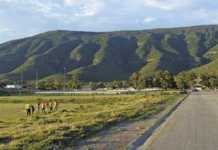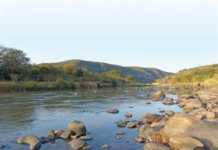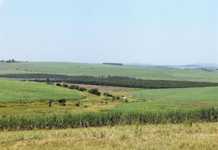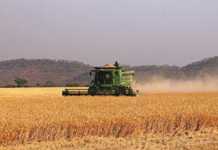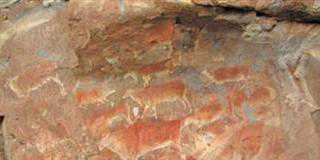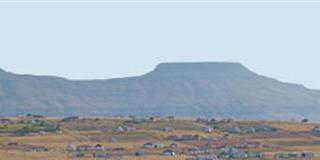Bundu Oil & Gas Exploration, a subsidiary of Australian-listed company Sunset Energy, has applied for gas exploration in the southern Karoo basin. They’re currently prospecting for shale gas trapped deep in the Karoo’s shale rock, in areas spanning over 380 000ha between Graaff-Reinet, Cradock, Somerset East and Pearston. But hundreds of farmers, landowners and community members were only given until 15 September to respond to the application – just two weeks from the 2 September meeting Bundu called to allegedly explain their process. Locals had received no previous information from Bundu, and over 200 people attended the meeting, including livestock and game farmers, landowners, community members, ANC Youth League (ANCYL) members and conservation and tourism officials. Two of Bundu’s directors, Peter Price from Johannesburg and John Zetzman from Texas, were expected to offer comprehensive answers to questions. “The meeting was supposed to be part of a ‘public participation process’ as prescribed by the Minerals and Petroleum Resources Development Act (MPRDA),” explains Graaff-Reinet attorney Derek Light, who represents over 30 landowners and farmers in the area.
“But Bundu’s representatives didn’t address the meeting, or afford the opportunity for questions, answers or comment. Instead they handed out pamphlets, saying attendants could raise questions with them in person.
“They later apologised and explained that this is how things are done in Australia, but since they aren’t new to South Africa this isn’t an acceptable explanation for their non-participation in the public process.”
He says Bundu has not been open with the affected communities, nor given them time to adequately respond. Though Bundu has indicated that most game reserves are excluded from the exploration area, which mainly affects commercial farms, residents are not assured. They complain that Bundu has not been transparent about their intentions, what the prospecting involves and how it affects them and their environment.“The way they have mishandled this process has really p*ssed people off, to put it mildly,” says Kitty Viljoen. She is the manager of AsanteSana Game Reserve, which covers 12 000ha some 70km from Pearston, where 250-million-year-old dinosaur tracks are found in the shale. “The community feels affronted and threatened. Bundu comes here, makes announcements and then goes off the radar. We haven’t heard from them since the meeting.”
The fraccing controversy
“The first we heard that they intend using a controversial process called ‘fraccing’ was in pamphlets at the meeting,” says Viljoen. Fraccing is short for hydraulic fracturing, which mixes millions of litres of water with sand and chemicals before pumping it into the ground to fracture the rock and release the gas. The volume of water alone is a concern in the water-stressed Karoo, but various US communities, where fraccing has been used, complain that it apparently contaminated their water. The US government is investigating the process. Says Paul Bilston of Sunset Energy, “Water is a key issue, and while we’re confident we’ll be able to obtain it for our explorations, we’ll need to look at how it is sourced and reused as part of any larger programme.” But residents want to know what Bilston is basing this “confidence” on, and how Bundu plans to obtain and reuse the water. None of this has been explained.
Critically endangered ecosystems
Substantial amounts of water will have an environmental impact, there’s a chance stray gas will contaminate aquifers, and there’s the question of how millions of litres of waste water, combined with chemicals and dissolved solids, will be disposed of. “This landscape contains critically endangered and vulnerable ecosystems, including Valley Thicket and Arid Albany Thicket, with long lists of rare and protected animal and plant species,” Light says. “Environmental specialist Dr Paul Marti, conducted a comprehensive study in the region, and his report comments on its sensitivity and recommends that current land use be preferred over mining.”Local treasures include the shepherd’s tree (Boscia oleoides), some specimens of which are over 500 years old, and the many-headed Euphorbia, one of the rarest living fossils in existence. SOEKOR first prospected for shale gas in the 1960s and 1970s, but a 200-page report indicated the region’s geology mitigates against finding gas in viable quantities. But Bundu claims that new technology makes it viable. They suggest that exploration activities will have little impact on land use and the environment.
“But what if the explorations show the gas can be exploited and that it is economically viable?” asks Light. “What will the extent of the operation be? One little well on a property, or thousands of wells? And once a production right is granted, landowners won’t be negotiating from a position of strength for compensation for their surface rights. These issues must be addressed before exploration rights are granted.”
False employment expectations?
Bundu has also created employment expectations without elaborating on facts and figures, and didn’t disclose publicly that the three-year exploration period would not create meaningful job opportunities.
“At the meeting the directors failed to answer questions about the project‘s empowerment aspects, the number of jobs that would be generated and the ownership of the company,” says Viljoen.“To raise expectations about jobs, without being specific, sounds appealing but it is not backed by facts at this stage,” says Light. “It also overlooks the considerable existing jobs offered by farms and game reserves, which have a domino effect across the whole employment chain, such as the production and processing of mohair and beef.”Bundu’s failure to address this issue at the meeting caused tension between landowners and township residents, with ANCYL members accusing farmers and landowners of jeopardising employment.
Legal wrangling
“Bundu has informed us that the Petroleum Agency SA turned down our request for an extension to the deadline,” says Light. “With two weeks to prepare our response, we have objected to the lack of reasonable and lawful consultation in this process, the lack of transparency in providing affected parties with Bundu’s intended plan of action, and the lack of environmental concern regarding both the use and potential contamination of water, as well as the potentially damaging affect on the region’s ecosystems.
“Our concerns have been communicated to the Petroleum Agency SA and Bundu. We shall also forward copies to the relevant ministers. The environmental affairs minister previously responded favourably to our concerns about Bundu’s 2009 application.”
“After we lodged our comments and objections, Bundu supplied some of the information and documentation called for and agreed to extend the deadline by seven days to 22 September.
“Our concern is not about the exploitation of gas per se, but we oppose a process which isn’t transparent, and doesn’t follow lawful process, carefully considers environmental impact and allows for proper consultation.“The minister should at least insist that fraccing, which is new to South Africa, be properly investigated by experts, including hydrologists, environmentalists and geologists and, if necessary, by those with expertise on the impact of fraccing in the US. We’re concerned that the speed with which the application is being processed may force the agency and the minister to base decisions on very little data. The process must be fully investigated and understood in advance, including the necessary checks and balances against contamination during and afterwards.
“Our greatest concern is that if the rights are granted, this may seriously harm the environment and well-established enterprises, industries and communities in the southern Karoo.”Contact Derek Light on 083 227 1922, or e-mail [email protected].Visit the Petroleum Agency SA website at www.petroleumagencysa.com. |fw


